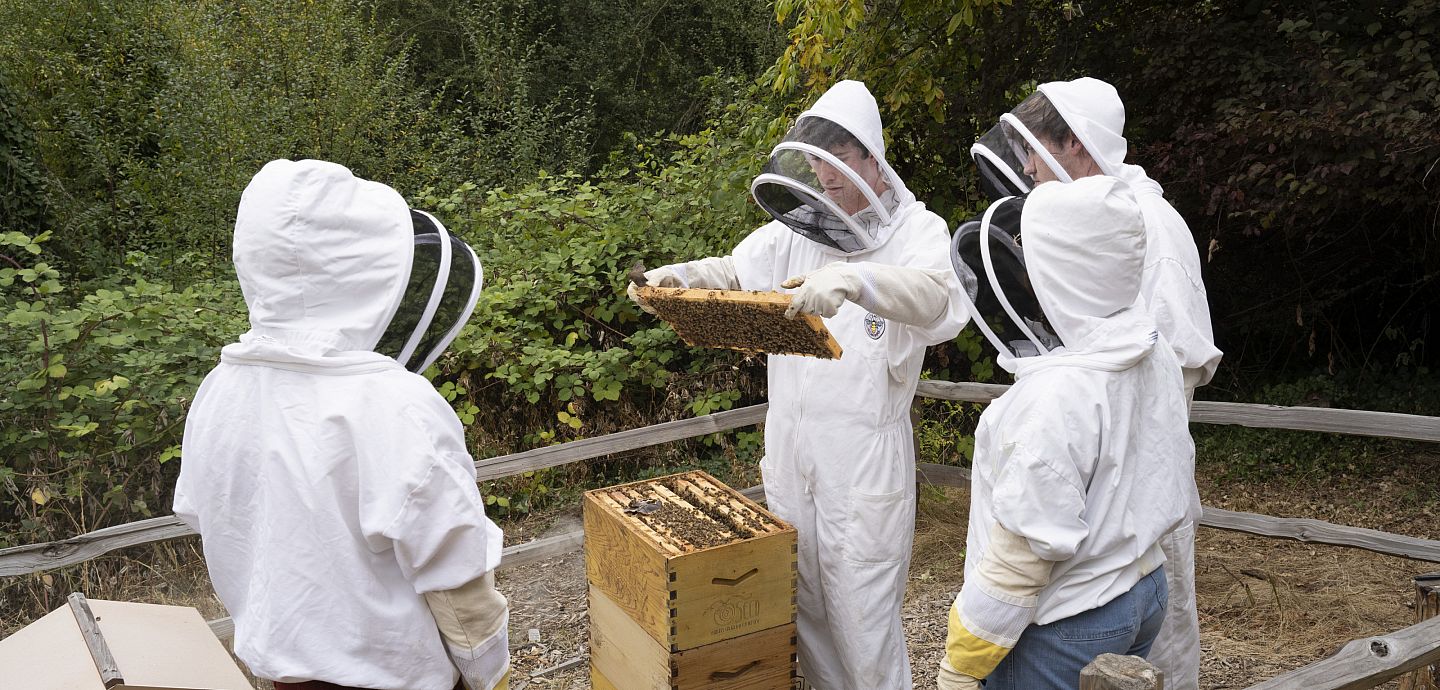
main contentSustainability at Lewis & Clark
Our Green Campus at Work
Lewis & Clark is deeply committed to learning, innovation, and principled action on matters related to sustainability. Our research and actions extend beyond the classroom across our campus and into Portland and the wider world. We build on the best available scholarship and practice while recognizing the importance and interrelatedness of ecology, economy, and equity. And we’ve put our money where our mouth is through an institutional net zero investment policy, which has us on track to completely eliminate greenhouse gas emissions from our portfolio by 2040. Join us as we make our campus—and our world—a better place.
Everyone here shares compassion for and values the natural world for future generations. L&C is not tunnel-visioned in the development of strategies that only work best for their pockets.
My experience working with sustainability has given me a lot of agency in making the changes that I want to see on campus.
Students should definitely expect to learn a lot about sustainability at L&C. It is actively discussed on campus, and there are a ton of clubs and opportunities to get involved, including SEED, Garden Club, and Tiny House Club.
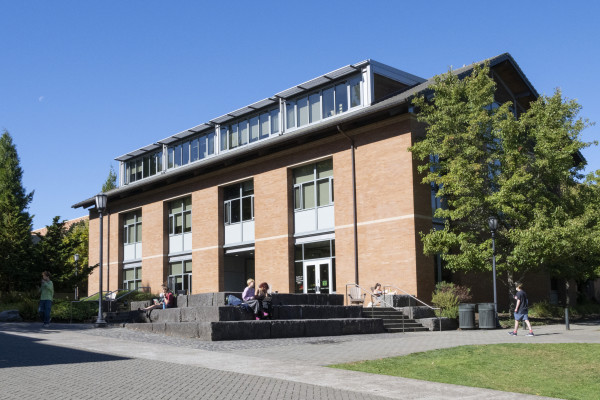
Energy and Buildings
Energy conservation and sourcing is a big part of our Climate Action Plan. Since 2002, our undergraduate students have sponsored an initiative that pays for 100 percent of our entire institution’s energy to come from renewable sources; surplus money goes into a fund that awards student projects supporting renewable energy. Many of our buildings are LEED Gold-certified, including J.R. Howard Hall and Holmes Residence Hall. The Office of Sustainability also has an energy efficiency intern position for undergraduate students. They work with L&C departments and the Energy Trust of Oregon to improve energy efficiency systems across the institution while networking with Portland leaders in the green sector.
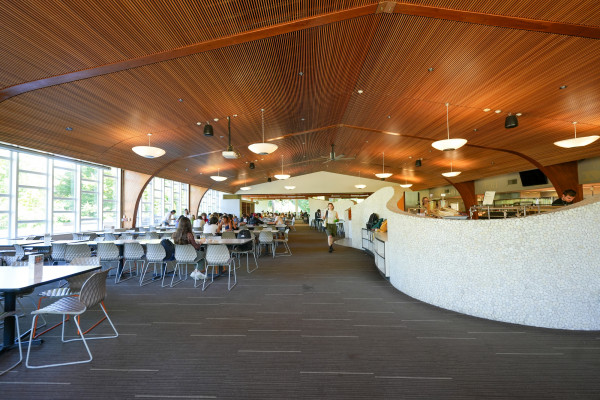
Food
Sustainability is of great importance to Bon Appétit, our food service provider. Their Farm-to-Fork Initiative means our dining halls strive to utilize locally sourced options from farmers around the Pacific Northwest whenever possible, giving our students the opportunity to enjoy super fresh regional favorites. They also have a Low Carbon Diet Program that addresses the relationship between food production, distribution, waste, and climate change. Bon Appétit is a founding member of the Equitable Food Initiative, a unique partnership that brings together growers, farmworkers, retailers, and consumers to transform agriculture and improve the lives of farmworkers.
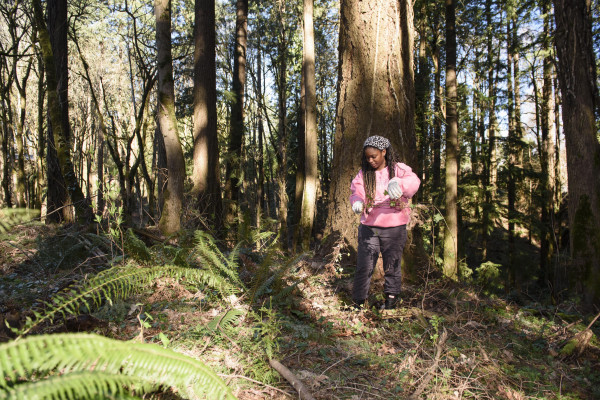
Natural Space and Landscapes
Lewis & Clark’s nationally recognized grounds are an incredibly important feature of our campus. Contributing to our health, well-being, and connection to place, our campus creates opportunities for curricular and cocurricular engagement across our 134 acres. We are bordered by Tryon Creek State Natural Area and River View Natural Area, and we are a part of two critical watersheds. Students spend time learning and working on our grounds and the adjacent natural areas by assisting with habitat protection and enhancement projects, managing gardens, and maintaining a multi-hive bee apiary.
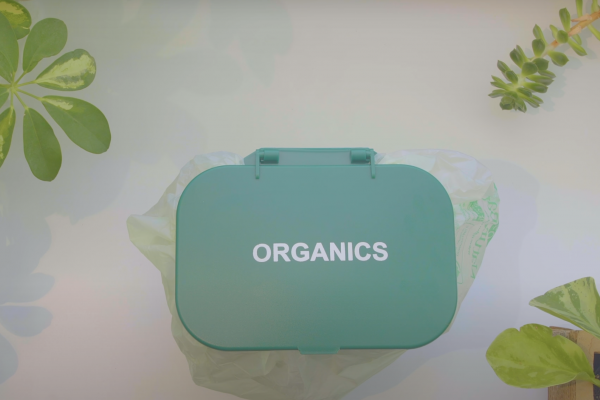
Recycling and Waste Reduction
Recycling bins are readily available throughout all three campuses, with e-waste handled directly at the Information Technology Service Desk. Composting bins are available for use in all of our dining and residential halls, and reusable food eco-containers are available for free for students to take their food to-go. Our Sustainability Office’s ReUse Room allows students to swap and shop for clothing, school supplies, household goods, and food, all for free!
Our commitment to sustainability has earned us the 17th spot on Princeton Review’s 2025 “Top 50 Green Colleges” list.
Lewis & Clark’s institutional net zero investment policy has us on track to completely eliminate greenhouse gas emissions from our portfolio by 2040.
For over 25 years, Lewis & Clark’s Environmental Law program has been a top-ranked program in the country by U.S. News & World Report. We are #3 on the 2024 “Best Environmental Law Programs” list.
100 percent of the institution’s electricity is sourced from renewable energy.
Our commitment to sustainability has earned us the 17th spot on Princeton Review’s 2025 “Top 50 Green Colleges” list.
Lewis & Clark’s institutional net zero investment policy has us on track to completely eliminate greenhouse gas emissions from our portfolio by 2040.
Sustainability in the Classroom
Sustainability is infused throughout many of Lewis & Clark’s academic programs across all three schools. Our undergraduate college’s environmental studies major and Earth system science minor put issues such as climate change and conservation at the forefront of their curriculum. Our law school has one of the nation’s best Environmental Law programs, and graduate students in counseling can pursue an innovative Ecotherapies Certificate. Undergraduate students have access to hands-on learning and research opportunities in Portland’s green sector, giving them a head start when it comes to finding a job after graduation.
Curricular Connections Bates Center Summer Sustainability Internship John S. Rogers Summer Science Research Program
Environmental Studies and Earth System Science Programs
Our interdisciplinary environmental studies program challenges our undergraduate students to transcend intellectual, geographic, and communication boundaries as they weave insights drawn from across the sciences and humanities; apply them in local, regional, and global contexts; and learn strategies to connect with the people and institutions they encounter. The Earth system science minor supplements our students’ academic experience with connections across scientific disciplines and a framework for understanding large-scale transformations of our planet and their consequences. Our students graduate with a bachelor’s degree, plus skills and experience they can apply to professional opportunities, graduate study, and effective environmental action, all while benefiting from our proximity to Portland and the diverse natural environments of the Pacific Northwest..
Environmental StudiesEarth System Science
Ecotherapies Certificate
Understanding people’s emotional connections with the natural world can be integral to meeting therapeutic, educational, or sustainability goals. Lewis & Clark Graduate School’s Ecotherapies Certificate program provides an opportunity for mental health practitioners and graduate students to enhance their training with an evidence-based, experiential, and socially progressive ecopsychology curriculum.
Bates Center for Entrepreneurship and Innovation
Our interdisciplinary entrepreneurship program combines critical thinking with direct links to the worlds of entrepreneurship, business, and positive social change. Our undergraduate students develop a greater understanding of themselves and others in order to collaborate more effectively through substantial experiential learning in courses such as sustainability, design thinking, nonprofit management, future technologies, leadership, and innovation. The program connects our students directly with Portland business and nonprofit leaders who understand the value of a liberal arts education and the importance of sustainability in today’s job market. Our graduates find that the Lewis & Clark network extends far beyond the Pacific Northwest.
Environmental Law
One of the top-ranked programs in the country, Lewis & Clark’s Environmental Law program allows our students to gain the legal expertise and experience to tackle the environmental, natural resource, and energy challenges of today and tomorrow. The program has six impact areas—climate resilience and energy; global environment; air, water, and land; ecosystems and biodiversity; environmental justice; and oceans and rivers—and a variety of degree and certificate programs. Undergraduate students who come to Lewis & Clark knowing they want to pursue a law degree can benefit from our 3-3 BA/JD program that saves them a year of time and tuition.
Get Involved
Our students don’t just learn about sustainability in the classroom; they can make an actual difference on campus by getting involved with the Sustainability Council, working as an intern for the Office of Sustainability, or participating in an active student-run organization.
Student Resources
Students have plenty of ways to make a change and pursue their sustainability passions. We have organizations, like Students Engaged in Eco-Defense (SEED) and Garden Club, that promote green practices and community building. We have a sustainable thrift shop, where students can donate goods and shop for free. We have an Environmental Action Living-Learning community for students who prioritize environmental sustainability. We have a student-led academic symposium. We have beehives! Are you ready to get your hands dirty and make a difference on campus?
Sustainability Student Internships
The Office of Sustainability has internship and work-study positions available, so our students can dig deeper into the real work behind sustainability initiatives. We typically hire students every year to be our sustainability reporting intern, ReUse Room coordinator, Renewable Energy Fee Fund coordinator, community engagement and media intern, energy efficiency intern, and sustainable operations intern. We also manage the Bates Center Summer Sustainability Internship class, where we match students with Portland organizations based on similar interests and skills.
Featured News
Green Move Out Information for Students
Donate any good condition items to Copeland, Tamarack, Stewart, Holmes. Main swap area will be held at Roberts 112 (formerly known as Maggie’s).
Sustainability Office is located in Fowler Student Center on the Undergraduate Campus.
MSC: 134
email advorak@lclark.edu
voice 503-768-7794
Senior Director of Sustainability Amy Dvorak
Sustainability Office
Lewis & Clark
615 S. Palatine Hill Road
Portland OR 97219
Office Hours: Thursdays 1 - 3:00 p.m.



